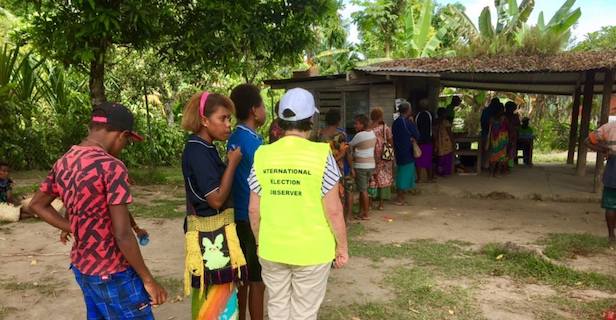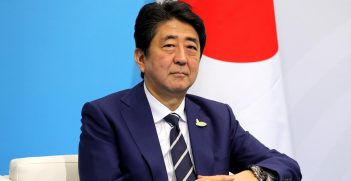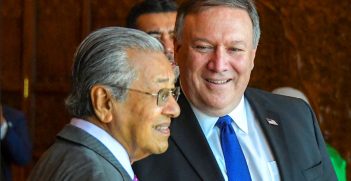Democracy under review in PNG elections

General elections began in Papua New Guinea on the weekend and voters will cast their judgement on Peter O’Neill’s government over the coming fortnight. Whatever the result, it is likely to mean changes for Australia’s relationship with its nearest neighbour.
Papua New Guinea is in the midst of its eighth general election. The current government came to power in August 2012 promising “stability and prosperity” following a tumultuous year when, for nearly seven months, the country appeared to have ‘two’ prime ministers. The government’s formative policy paper, the Alotau Accord, asserted that the government of Peter O’Neill would “be remembered by the people of Papua New Guinea as the most decisive, action-packed, transparent and accountable government the nation has ever had.” Five years later, the voters have to judge whether this goal has been achieved.
On taking office, the O’Neill government immediately appealed to the people through its flagship policies of free health and education services and infrastructure development backed by a strong anti-corruption focus in the form of the Investigative Task Force Sweep (ITFS).
Projected revenues from the billion-dollar liquefied natural gas (LNG) project and other resource developments in the country provided the assurances that O’Neill’s welfare policies would be sustained and effectively delivered. On the anti-corruption front, O’Neill pledged to support the ITFS to systematically “weed out corruption“ in PNG.
What has happened?
For many, the results are unconvincing. The high hopes of sustained payouts from the LNG project and the broader resource industry were soon dashed, leading the government to take out huge foreign loans to supplement the national budget and sustain its welfare policies. As loan repayments took preference, and many resource revenues were depleted, the result was a period of continued budget deficits.
O’Neill’s promise of free schooling has increased access to education for students, but it also means overcrowding in classrooms. Overcrowding, the lack of teaching materials and teacher shortages continue to affect the quality of education. Whether the policy has had a measurable impact on the quality of education in PNG, as opposed to quantity, is doubtful. The country’s hospitals have faced similar difficulties running out of funds to sustain their operations. A request earlier this year for Australian aid to fund schools and hospitals, as well as infrastructure, indicates the challenges ahead.
Corruption
Prime Minister O’Neill inherited a system already plagued by corruption, but it appeared to escalate during his reign. His promise to “weed out corruption“ had early successes. However, praise for O’Neill quickly turned to distrust, as he himself became subject of a corruption investigation, involving an alleged fraudulent payment of an estimated AU$28 million. O’Neill dismissed the allegations as “politically motivated“.
The extent of O’Neill’s efforts to avoid arrest would make the case one of the most highly convoluted corruption investigations in the Pacific. O’Neill promised to “fight it to the very last breath” and so far it seems he has achieved his goal. After more than two years, the exhausted investigators recently decided to discontinue the case against the prime minister.
Judgement day
The 2017 elections provide the opportunity for PNG voters to weigh in on these issues and cast their judgment on O’Neill’s government. But will voters be able to make the ‘right’ decision in all fairness amidst concerns of electoral fraud and bribery? The ‘right’ decision for PNG voters would be to make a choice that contributes to rebuilding the economy, strengthening the institutions of governance and restoring the rule of law. But there are some ingrained challenges that may need to be overcome for this to happen.
First is the issue of vote buying, which is becoming increasingly prevalent under the limited preferential voting (LPV) system first introduced in 2012. While LPV has positively increased political participation, with three options, voters often reserve the first vote for their preferred candidate and put the other two options on auction to the highest bidder.
Another issue for voters is framed around the constitutional right to public office. While it has increased both the volume of candidates and level of political participation, it also inhibits building a robust political system. Simply having the right to stand may not always mean one is capable of occupying the political office; especially for traditional leaders or those with very limited experience, education and skills or the ability to acquire them. As a result, the power of government continues to concentrate within a small political elite.
Australian engagement
Australia watches with interest, not only for PNG to have a free, fair and safe election, but to see how a new government will shape relations. Australia’s engagement with the O’Neill government started somewhat controversially in 2012 with allegations about its former high commissioner supporting O’Neill’s bid for the prime minister’s position. The Manus Island Detention Centre agreement benefitted both governments, but at the expense of breaches of the PNG constitution, among other setbacks.
Prime Minister O’Neill enjoyed the warmth of a silent friend in Australia during his long and convoluted corruption allegations, which saw the near breakdown of the rule of law in PNG. Australia has been criticised as a ‘Cayman Island’ for proceeds of corruption from PNG. These issues may not have overshadowed Australia’s important contributions to the development of the country but they do put into question its commitment to PNG’s rule of law.
Working with O’Neill’s government has not always been easy for Australia. The removal of Australian advisers from PNG government departments over concerns about spying, and the reluctance of PNG to join the Pacer Plus trade agreement spearheaded by Australia and New Zealand—which some suggested rendered the agreement “worthless“—demonstrate the importance of Australia’s relations with the incoming PNG government.
As an established democracy, Australia is held in high regard in the Pacific but, at times, it is not clear if Australia is willing to take a leadership role at the expense of its own interests. PNG’s new government will be wary of past experiences as it forges its bilateral relations with Australia and other competing interests in the Pacific region.
Election outcomes
O’Neill is confident of forming the next government. However, PNG has always had a high turnover rate of MPs and this is unlikely to change, especially given the widespread allegations of corruption and mismanagement besieging the government. If O’Neill wins his local seat, it may be difficult to gain the support of the coalition parties that would most likely question his credibility as a candidate for prime minister.
Apart from O’Neill’s People’s National Congress, there are 44 political parties heading into this election and all of them are equally optimistic of forming the next government. The ultimate question for voters is not who forms the next government, but who is the most credible person to lead the country at a time of unprecedented economic and political challenges.
Bal Kama is a PhD candidate at the ANU College of Law and a sessional lecturer at the University of Canberra’s Faculty of Business, Government and Law.
This article is published under a Creative Commons Licence and may be republished with attribution.





